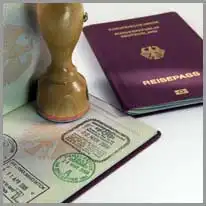Vocabulary
Learn Verbs – Thai

จัดการ
ต้องจัดการกับปัญหา
cạdkār
t̂xng cạdkār kạb pạỵh̄ā
handle
One has to handle problems.

แสดง
ฉันสามารถแสดงวีซ่าในพาสปอร์ตของฉัน
s̄ædng
c̄hạn s̄āmārt̄h s̄ædng wīs̀ā nı phās̄ pxr̒t k̄hxng c̄hạn
show
I can show a visa in my passport.

กลับ
พ่อกลับมาจากสงครามแล้ว
klạb
ph̀x klạb mā cāk s̄ngkhrām læ̂w
return
The father has returned from the war.

สังเกต
เธอสังเกตเห็นคนอยู่ข้างนอก
s̄ạngket
ṭhex s̄ạngket h̄ĕn khn xyū̀ k̄ĥāng nxk
notice
She notices someone outside.

ด sounding
เสียงของเธอ sounding ดีเยี่ยม
d sounding
s̄eīyng k̄hxng ṭhex sounding dī yeī̀ym
sound
Her voice sounds fantastic.

เอาชนะ
นักกีฬาเอาชนะน้ำตก
Xeāchna
nạkkīḷā xeāchna n̂ảtk
overcome
The athletes overcome the waterfall.

นำ
ข่าวสารนำพัสดุมา
nả
k̄h̀āws̄ār nả phạs̄du mā
bring
The messenger brings a package.

อนุญาต
พ่อไม่อนุญาตให้เขาใช้คอมพิวเตอร์ของเขา
xnuỵāt
ph̀x mị̀ xnuỵāt h̄ı̂ k̄heā chı̂ khxmphiwtexr̒ k̄hxng k̄heā
allow
The father didn’t allow him to use his computer.

รักษา
คุณควรรักษาความเย็นเสมอในสถานการณ์ฉุกเฉิน
rạks̄ʹā
khuṇ khwr rạks̄ʹā khwām yĕn s̄emx nı s̄t̄hānkārṇ̒ c̄hukc̄hein
keep
Always keep your cool in emergencies.

แสดง
เขาแสดงโลกให้ลูกชายเห็น
s̄ædng
k̄heā s̄ædng lok h̄ı̂ lūkchāy h̄ĕn
show
He shows his child the world.

ยืนขึ้นสำหรับ
สองเพื่อนต้องการยืนขึ้นสำหรับกันและกันเสมอ
yụ̄n k̄hụ̂n s̄ảh̄rạb
s̄xng pheụ̄̀xn t̂xngkār yụ̄n k̄hụ̂n s̄ảh̄rạb kạnlæakạn s̄emx
stand up for
The two friends always want to stand up for each other.

